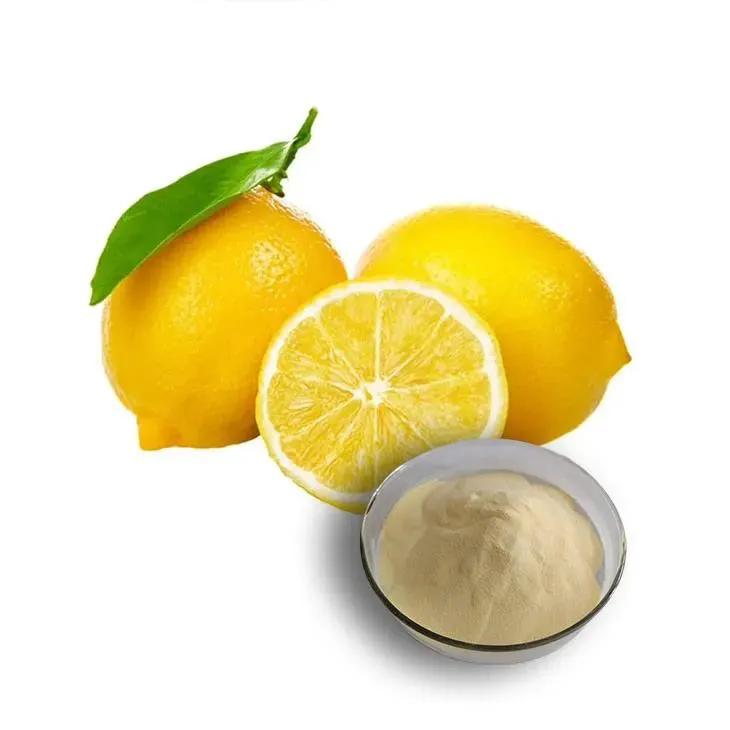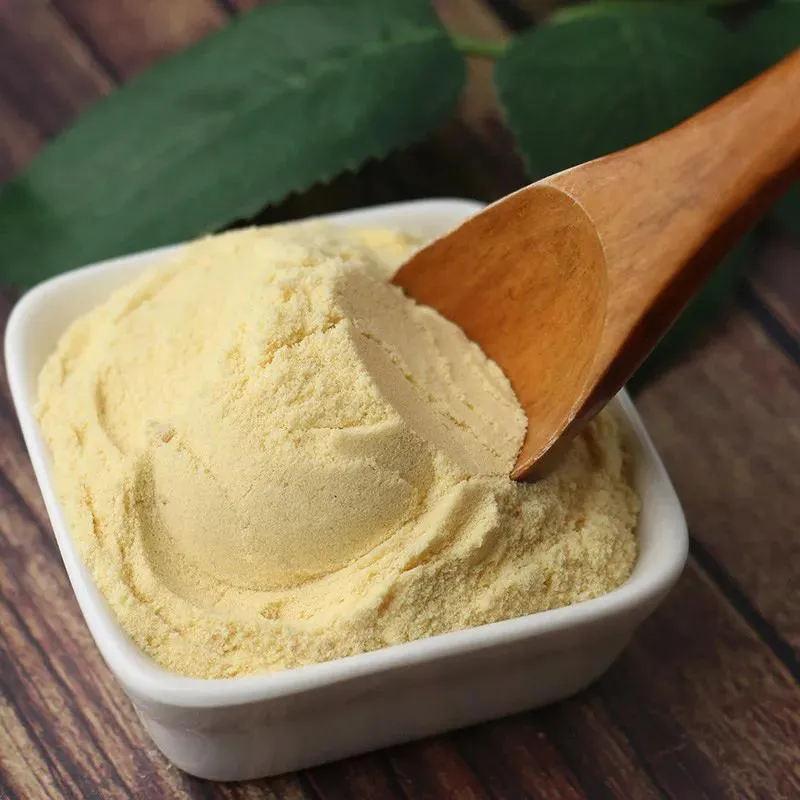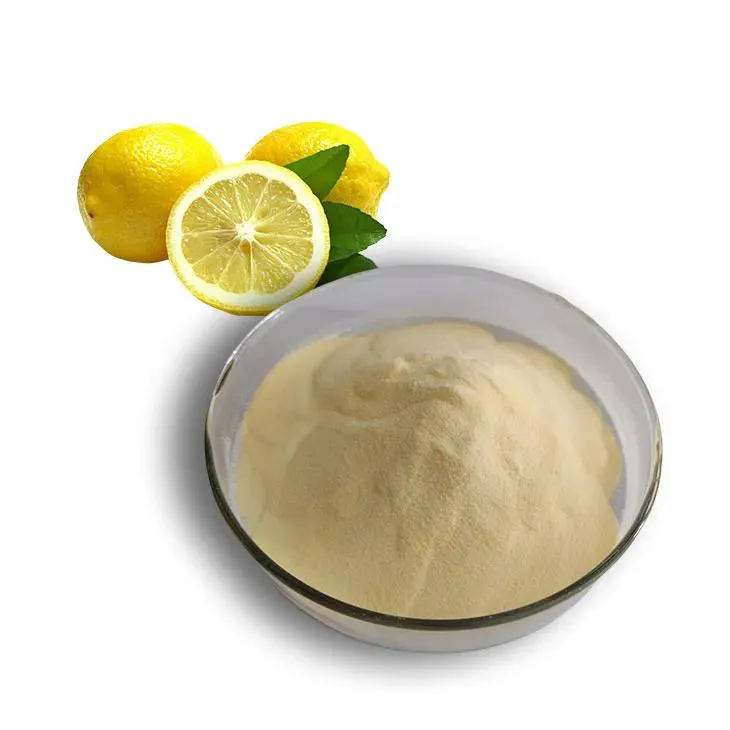- 0086-571-85302990
- sales@greenskybio.com
Use lemon juice powder? Make sure you source from sustainable suppliers!
2024-12-21

1. Introduction
Lemon Juice Powder has been steadily gaining popularity in recent years. It offers a convenient alternative to fresh lemon juice, especially in applications where the latter may not be practical, such as in certain long - shelf - life food products, dry mixes, or for those who may not have access to fresh lemons on a regular basis. However, as with any product, it is crucial to consider the source of this Lemon Juice Powder. Sustainable sourcing is not just a trendy concept but a necessity for the well - being of our planet and the fairness of global trade.

2. The Environmental Impact of Lemon Juice Powder Production
2.1. Agricultural Practices
The production of lemons, which are the base ingredient for lemon juice powder, has a significant environmental footprint. Conventional farming methods often involve the use of large amounts of pesticides and fertilizers. These chemicals can contaminate soil and water sources. For example, pesticides can seep into groundwater, which is a vital source of drinking water for many communities. In addition, the over - use of fertilizers can lead to eutrophication in nearby water bodies, causing algal blooms that deplete oxygen levels and harm aquatic life.
Sustainable suppliers, on the other hand, are more likely to adopt organic farming practices. Organic lemon farming reduces the use of synthetic chemicals. Instead, they rely on natural methods such as crop rotation, composting, and biological pest control. Crop rotation helps to maintain soil fertility by alternating different crops in the same field over time. Composting provides natural nutrients to the soil, and biological pest control, like introducing beneficial insects, can keep pest populations in check without the need for harmful pesticides.
2.2. Water Usage
Lemon cultivation requires a substantial amount of water. In regions where water is scarce, this can put a strain on local water resources. Unsustainable farming operations may not manage water efficiently, leading to waste. For instance, some farms may use flood irrigation methods that are not very water - efficient.
Sustainable suppliers are aware of water conservation. They may implement drip irrigation systems which deliver water directly to the roots of the lemon trees in a slow and controlled manner. This not only reduces water waste but also ensures that the plants receive the appropriate amount of water. Additionally, some sustainable farms may recycle water used in the processing of lemon juice powder, treating it to a suitable standard for reuse in irrigation or other non - potable applications.
2.3. Carbon Footprint
The production, processing, and transportation of lemon juice powder all contribute to its carbon footprint. Conventional production methods may use energy - intensive machinery in the processing plants, and long - distance transportation of lemons or the final powder product can add to the emissions of greenhouse gases. For example, if lemons are transported over long distances by air freight, which is a relatively high - carbon - emitting mode of transport, it significantly increases the overall environmental impact.
Sustainable suppliers aim to reduce this carbon footprint. They may invest in more energy - efficient processing equipment. In terms of transportation, they may prefer local or regional distribution networks to minimize the distance traveled. Some may also explore alternative, lower - carbon transport options such as sea freight for longer - distance shipments when possible. Moreover, sustainable farms may plant trees on their land to offset some of the carbon emissions associated with their operations.

3. Quality Considerations
3.1. Purity and Additives
When sourced from non - sustainable suppliers, there is a risk that lemon juice powder may contain unwanted additives. Some suppliers may add artificial flavors, colors, or preservatives to cut costs or to enhance the appearance of the product. However, these additives can be harmful to consumers, especially those with certain allergies or sensitivities. For example, some artificial preservatives have been associated with adverse health effects.
Sustainable suppliers are more likely to focus on providing pure lemon juice powder. They understand the importance of maintaining the natural integrity of the product. By using high - quality lemons and clean processing methods, they can produce a powder that is free from unnecessary additives. This not only ensures a better - tasting product but also a healthier one for consumers.
3.2. Nutritional Value
The nutritional value of lemon juice powder can vary depending on how it is sourced and processed. If lemons are not grown in optimal conditions or are over - processed, they may lose some of their important nutrients. For instance, vitamin C, which is one of the key nutrients in lemons, can be degraded during improper processing.
Sustainable suppliers take measures to preserve the nutritional value. They start with healthy lemons grown in good soil and proper environmental conditions. Their processing methods are designed to minimize nutrient loss. This means that when consumers choose lemon juice powder from sustainable sources, they are more likely to get a product that retains its beneficial vitamins, minerals, and antioxidants.

4. Fair Trade and Social Responsibility
4.1. Working Conditions
In many lemon - producing regions, the workers who are involved in the cultivation and processing of lemons often face challenging working conditions. Non - sustainable suppliers may not provide fair wages, safe working environments, or proper labor rights. Workers may be exposed to harmful chemicals without adequate protection, and they may work long hours for low pay.
Sustainable suppliers, on the other hand, adhere to fair trade principles. They ensure that the workers are paid a living wage, which is sufficient to cover their basic needs and support their families. They also provide safe working conditions, including proper protective equipment when handling pesticides or operating machinery. These suppliers may also offer training and development opportunities for the workers, enabling them to improve their skills and career prospects.
4.2. Community Impact
The presence of sustainable lemon juice powder suppliers can have a positive impact on local communities. They may invest in local infrastructure, such as building schools or improving roads. This helps to improve the overall quality of life in the area. Sustainable suppliers may also support local small - scale farmers by providing them with access to markets, technical assistance, and fair prices for their lemon produce.
Conversely, non - sustainable suppliers may extract resources from the community without giving back. They may drive local farmers out of business by offering very low prices for their lemons, leading to economic decline in the area. By choosing sustainable suppliers, consumers are indirectly contributing to the well - being of these communities.

5. How to Identify Sustainable Suppliers
5.1. Certifications
One of the easiest ways to identify sustainable suppliers is by looking for relevant certifications. For example, organic certifications indicate that the lemons are grown using organic methods without the use of synthetic pesticides and fertilizers. There are also certifications related to fair trade, which ensure that the workers are treated fairly and that the supply chain is transparent.
Another important certification is related to environmental management, such as ISO 14001. Suppliers with this certification have demonstrated their commitment to environmental protection through effective management of their environmental aspects. However, it is important to note that not all sustainable suppliers may have all these certifications, but they may still follow sustainable practices. So, certifications are a good starting point but not the only factor to consider.
5.2. Transparency in the Supply Chain
A sustainable supplier should be transparent about its supply chain. This means that they should be able to provide information about where the lemons are grown, how they are processed, and how the final product is transported. Transparency helps to build trust with consumers. For example, a supplier could have a website or brochure that details their supply chain, including the names of the farms they work with and the processing facilities they use.
If a supplier is reluctant to share information about its supply chain, it could be a red flag. Consumers should be cautious about dealing with such suppliers as there may be hidden issues, such as unethical practices or environmental problems that they do not want to disclose.
5.3. Customer Reviews and Reputation
Checking customer reviews and the reputation of a supplier can also be very helpful. Online platforms often have reviews from previous customers who can share their experiences with the quality of the lemon juice powder and the supplier's practices. A supplier with a good reputation is more likely to be sustainable.
However, it is important to note that some reviews may be fake or influenced, so it is advisable to look at multiple sources of reviews and also consider other factors such as certifications and supply chain transparency when making a judgment.
6. Conclusion
Lemon juice powder is a versatile and convenient product, but it is essential that consumers make an effort to source it from sustainable suppliers. By doing so, they can contribute to reducing the environmental impact of production, ensure high - quality and pure products, and support fair trade and social responsibility. Identifying sustainable suppliers may require some research, but the long - term benefits for both the consumers and the global community are well worth it.
FAQ:
1. Why is it important to source lemon juice powder from sustainable suppliers?
When sourcing lemon juice powder from sustainable suppliers, it has several benefits. Firstly, in terms of environmental impact, sustainable suppliers are more likely to use farming and production methods that are friendly to the environment. For example, they may use less pesticides which can reduce pollution to soil and water. Secondly, sustainable suppliers often ensure better quality. They tend to follow strict production standards which can lead to a purer and more consistent product. Thirdly, it is related to fair trade. Sustainable suppliers usually pay fair wages to farmers and workers involved in the production process, which helps to support local economies and improve the living standards of those people.
2. How can consumers identify sustainable suppliers of lemon juice powder?
Consumers can look for several signs to identify sustainable suppliers. One way is to check for certifications. For example, some well - known environmental certifications like organic certifications can indicate that the products are produced in an environmentally friendly way. Also, fair trade certifications can show that the suppliers follow fair trade principles. Another way is to research the supplier's reputation. This can be done by reading reviews from other customers or looking at industry rankings. Additionally, consumers can contact the supplier directly to ask about their production methods, such as how they source the lemons, what kind of farming practices they use, and how they ensure fair treatment of workers.
3. Are there any disadvantages to not sourcing from sustainable suppliers?
Yes, there are. If not sourcing from sustainable suppliers, the environmental impact can be significant. Non - sustainable farming methods may lead to soil degradation, water pollution, and loss of biodiversity. In terms of quality, products from non - sustainable suppliers may be of lower quality due to the use of more chemicals or less strict production processes. Also, without the support of sustainable supply chains, farmers and workers may not be fairly compensated, which can lead to social problems such as poverty in local communities.
4. How does sourcing from sustainable suppliers affect the taste of lemon juice powder?
Sourcing from sustainable suppliers can potentially have a positive impact on the taste. Sustainable suppliers often use high - quality lemons grown in better conditions. For example, if the lemons are grown organically without excessive use of chemicals, they may have a more natural and intense flavor. Also, sustainable production methods may ensure that the lemons are harvested at the right time, which can also contribute to a better - tasting final product.
5. What role does the government play in ensuring sustainable sourcing of lemon juice powder?
The government can play several important roles. It can set regulations and standards for the production and sourcing of lemon juice powder. For example, it can enforce environmental protection laws to ensure that suppliers do not cause excessive pollution during production. The government can also promote fair trade by providing incentives or subsidies to sustainable suppliers. Additionally, it can support research and development in sustainable production methods, which can help the industry as a whole to move towards more sustainable sourcing.
Related literature
- Sustainable Sourcing in the Food Industry: A Comprehensive Guide"
- "The Importance of Sustainable Suppliers for Citrus - Based Products"
- "Environmental and Social Impacts of Non - sustainable Lemon Juice Powder Sourcing"
- ▶ Hesperidin
- ▶ citrus bioflavonoids
- ▶ plant extract
- ▶ lycopene
- ▶ Diosmin
- ▶ Grape seed extract
- ▶ Sea buckthorn Juice Powder
- ▶ Beetroot powder
- ▶ Hops Extract
- ▶ Artichoke Extract
- ▶ Reishi mushroom extract
- ▶ Astaxanthin
- ▶ Green Tea Extract
- ▶ Curcumin Extract
- ▶ Horse Chestnut Extract
- ▶ Other Problems
- ▶ Boswellia Serrata Extract
- ▶ Resveratrol Extract
- ▶ Marigold Extract
- ▶ Grape Leaf Extract
- ▶ blog3
- ▶ blog4
- ▶ blog5
-
Pure 85% Tomentil Extract.
2024-12-21
-
Pueraria Lobata Extract
2024-12-21
-
Grape Seed Extract
2024-12-21
-
Camu Camu Extract
2024-12-21
-
Mango flavored powder
2024-12-21
-
Feverfew Extract
2024-12-21
-
Hesperidin
2024-12-21
-
Boswellia Serrata Extract
2024-12-21
-
Dandelion Leaf Extract
2024-12-21
-
Curcuma Longa Extract
2024-12-21
-
Echinacea Extract
2024-12-21





















